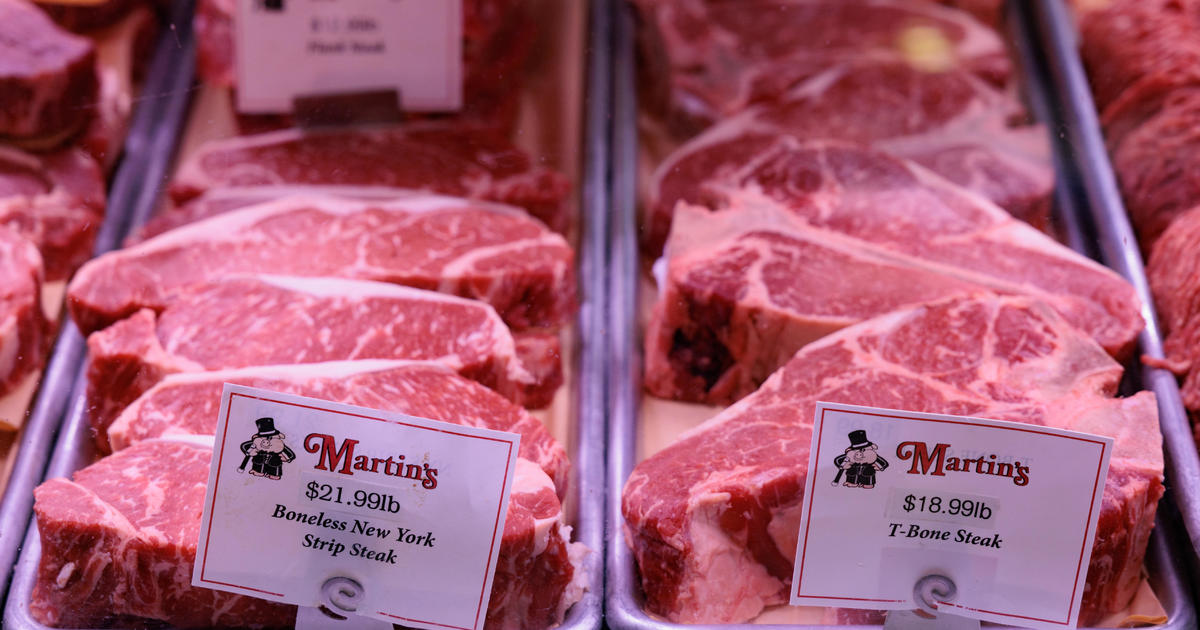CBS News
Inflation is cooling. So why are food prices, from steak to fast-food meals, still rising?

Inflation may be rapidly cooling, but there’s one area that continues to eat away at Americans’ budgets: Stubbornly high food prices.
Rising food costs were one contributor to the hotter-than-expected inflation report on Tuesday, with food prices rising 0.4% in January from December, a faster pace than the overall 0.3% rise in the Consumer Price Index (CPI).
The CPI, a basket of goods and services typically bought by Americans, measures two types of food purchases, groceries and “food away from home,” or restaurant and other prepared meals. Both are rising, but restaurant prices are increasing at a faster pace, jumping 5.1% on an annual basis compared with a 1.2% increase in grocery costs.
Any increase in food prices may be especially painful to American consumers, given that supermarket prices are now 25% higher than in January 2020, while inflation has increased 19% over that same time. That means even though grocery costs are now rising at a slower pace than in the depth of the pandemic’s inflationary spike, the same shopping basket still costs more than a month or a year ago, a fact that has soured many consumers on the economy.
Two-thirds of voters polled by Yahoo Finance/Ipsos late last year said food prices are where they’re most impacted by inflation, far outpacing the 1 in 10 who said they feel the impact through gas prices or higher rents.
January’s stubbornly high inflation rate was “boosted by a notable uptick in food inflation back to 0.4%,” noted Greg Wilensky, head of U.S. fixed income at Janus Henderson Investors, in a Tuesday email, adding, “We have not seen a food inflation print this high since the beginning of last year.”
The reason for inflation’s stubborn hold on food prices can be linked to a number of issues, from higher labor costs at manufacturers that trickle down to consumers, to record-low cattle numbers that are driving up the cost of beef and steak.
But some policy experts see other issues at work: Corporations, they claim, are increasing prices simply because they can. President Joe Biden last month warned that companies are “ripping people off” with a combination of price gouging, “greedflation” and shrinkflation.
Greedflation refers to when companies hike product prices beyond the rate of inflation in order to juice their profits — a concept that Northeastern University economist William Dickens notes has become politicized, with Democrats typically leaning into the idea. Republicans, meanwhile, tend to blame the Biden administration for higher prices.
What’s causing higher food prices
In fact, five types of food have been responsible for 30% of grocery inflation in recent years, the left-leaning think tank Groundwork Collective found in a February report. They are beef and veal; poultry; non-frozen, non-carbonated juices and drinks; fresh fruits and vegetables; and snacks.
A few of those categories were among the drivers of January’s hike in food prices, with beef and veal jumping 7.7% last month. Frozen non-carbonated drinks like orange juice surged 29% last month on an annual basis, while non-frozen non-carbonated drinks rose 4.2%, the CPI data shows.
The reason for the hikes may be due to supply issues and climate change, rather than corporate greed. Drought has reduced pasture for raising cows, leading to smaller cattle herds, according to the U.S. Department of Agriculture. And orange production has been impacted by severe weather events and the citrus greening disease, which doesn’t have a cure.
Fast-food price hikes are on the menu
Meanwhile, Americans are also getting walloped when they go out to eat, with fast-food prices jumping 5.8% in January from a year earlier, according to the inflation data released on Tuesday.
McDonald’s is one of the chains that has recently boosted prices, but that may be turning away some price-sensitive customers. CEO Chris Kempczinski earlier this month said the burger giant saw fewer visits and lower spending by customers earning $45,000 per year or less.
“We certainly know consumers are more wary — and weary — of pricing and we’re going to continue to be consumer-led in our pricing decisions as we look forward to 2024,” McDonald’s Chief Financial Officer Ian Borden said on an earnings call earlier this month.
Rising prices at the grocery store and restaurants don’t impact Americans evenly. Low-income consumers are hit much harder because they must spend a much larger share of their income to afford the basics.
In fact, people in the bottom 20% of earners, whose income is about $14,000 a year, spend 25% of their money on groceries, compared with 3.5% for those in the top 20%, with annual income of about $244,000, the Groundwork Collective found.
Despite January’s hotter-than-expected price increases, shoppers should get a break later this year. Grocery prices will continue to moderate and could end the year with a slight decrease of 0.4%, according to a January USDA forecast. But those who love to eat out may not get much relief, with the USDA predicting that restaurant meals will end the year up 4.7%.
CBS News
One year after Oct. 7 attack, the toll on civilians remains high

Watch CBS News
Be the first to know
Get browser notifications for breaking news, live events, and exclusive reporting.
CBS News
Open: This is “Face the Nation with Margaret Brennan,” Oct. 6, 2024

Watch CBS News
Be the first to know
Get browser notifications for breaking news, live events, and exclusive reporting.
CBS News
Kamala Harris will speak with “60 Minutes” tomorrow. Here’s what to know for the interview.

Voters will get the chance to hear from Vice President Kamala Harris on Monday as she presents her case for why she should be president in a “60 Minutes” election special.
For decades, “60 Minutes” has featured both Republican and Democratic nominees for presidents, but this year, former President Donald Trump backed out after previously indicating he would be on the show. Correspondent Scott Pelley, who’d been set to interview Trump, will instead travel to Arizona’s Maricopa County, home to more than 60% of Arizona’s voters and a critical battleground in a key swing state.
One thing is certain about the election; with the U.S. deeply involved in both the wars in Ukraine and the Middle East, whoever wins on Nov. 5 will become a wartime president.
What Harris will discuss
Israel’s war started one year ago after Hamas launched a surprise terror attack and correspondent Bill Whitaker will discuss the ongoing war with Harris.
Harris will also discuss the economy, immigration, her record as vice president and the differences between herself and Trump.
Democratic vice presidential candidate Gov. Tim Walz will also appear.
Whitaker joined the Democratic ticket on the campaign trail this week to gain insight into their platform’s priorities and values, and what the candidates believe voters should know.
Why Trump pulled out of the “60 Minutes” interview
Leading up to the candidate hour, Trump, through campaign spokespeople, was the first candidate to accept the “60 Minutes” request to be interviewed for the special, according to CBS News. It had been agreed that both candidates would receive equal time during the broadcast.
Trump last sat down with 60 Minutes in 2020. He walked out during the interview with Lesley Stahl. Trump referenced the incident on Tuesday night at a Milwaukee press conference when asked about his decision not to participate in the Oct. 7 “60 Minutes” election special.
“Well, right now, I went to – they came to me and would like me to do an interview, but first I want to get an apology, because the last time I did an interview with them, if you remember, they challenged me on the computer,” Trump said. “They said the ‘laptop from hell’ was from Russia, and I said it wasn’t from Russia. It was from Hunter, and I never got an apology, so I’m sort of waiting. I’d love to do ’60 Minutes.’ I do everything.”
The Republican nominee for president emphasized that he felt he was owed an apology from “60 Minutes.”
“Let’s see if they do it. I wouldn’t mind doing 60,” Trump continued. “I’ve done ’60 Minutes’ a lot.”
In a statement on Tuesday, Trump campaign communications director Steven Cheung said that Trump’s team had not agreed to an interview.
“Fake News,” Cheung said in a post on X. “60 Minutes begged for an interview, even after they were caught lying about Hunter Biden’s laptop back in 2020. There were initial discussions, but nothing was ever scheduled or locked in. They also insisted on doing live fact checking, which is unprecedented.”
Previous Trump, Harris appearances on 60 Minutes
Trump previously sat down with “60 Minutes'” Mike Wallace in 1985, Pelley in 2015 and Lesley Stahl twice in 2016, first in July of that year and then again in November of 2016. He also spoke with Stahl again in 2018 and 2020.
Harris previously sat down with Whitaker last year. She also was interviewed by Norah O’Donnell, “CBS Evening News” anchor and “60 Minutes” contributing correspondent, in 2020.








